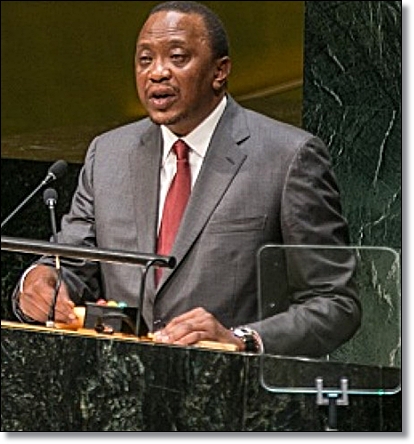The UN and Africa: Who Should Style Up?

 |
|
H.E. President Uhuru Kenya addresses the recent UN General Assembly |
In the world made up of nearly 200 nations, Africa with its odd 47 nations make up the chunk of nations commanded, controlled and guided by UN rules and regulations. Africa has more countries per continent than any other. It is a laboratory for trials and errors, examples of what not to do or where ‘iffy’ projects are tried to see whether they make sense. Why is that? Africans naively and sheepishly welcome outsiders to tango with them often leading to unpleasant tangle.
Since leadership in Africa - Kenya a good example - refused to develop from within, they become easy subject of outside control, and machination and manipulation - making Africa wide open for business – any business.
Kenya, since independence more than 50 years ago and with only less than five presidents in its history, has shown that democracy is not a panacea for economic development. Its stability in civilian rule has not translated into resounding economic development as one would have expected from having stability. It is still a basket case.
The UN is only a relevant organization by default and design, and no one should make a mistake about it. If African nations were to get their acts together, organizations such as the UN, IMF and World Bank would almost go out of business. But with continued malfeasance and maladministration, coupled with inter- and intra- tribal conflicts that consume Africa, such world agencies set up by the ‘master’ must make sure the errant behavior of foul and sour leaderships in Africa are put in check. Controlling to curtail and contain is part of international relations.
Despite all the perennial conflicts between Israel and Palestine, Israel is unyielding that it does not want the UN Peace Keeping Force presence within its borders. The world has reluctantly responded and allowed Israel to do as it wishes. Being bold is good when dealing with outside influence. Any African leadership mustering such position to state its stake on matters national to them is yet to be seen. They invite the UN and beg for them to come and take over. Like Igbos say, those who invite ants into their home must bear the consequences. It is no different in this circumstance--not in this century given how present day Africa’s leaders are still globe-trotting seeking endorsement and approval on how to manage their economy or manage conflicts within their borders.
On global epidemics such as Ebola, President Kenyatta again appears to blame the UN and the west for doing nothing. Please. What stops any African nation from developing and investing in its public health infrastructure, cultivating bilateral or multilateral relationships to handle such matters? No nation is immune from epidemics but not all run to the UN or WHO. Why must African nations be the ones everyone teaches how to do anything while Africans parade PhDs and are best in class on most subjects? Why are Africans unable to cure themselves on matters that those who attended the same school with them are able to?
What medical or healthcare school in the world has an African not attended and possibly graduated on top of their class? None. But once handed the paper, it is more about show than substance as their value in solving national problems always falls short. Did Africans go to school for the glamor? Kenya’s former President, Mwai Kibaki, made First Class Honors from the London School of Economics. How did that help him while he served Kenya?
President Kenyatta pointed out that African nations have more membership in UN. That is true. But when one considers the membership dues contribution, the 47 or so African nations pay less than 5% of what it takes to sustain UN. Those who pay the piper dictate the tune? Is this lost on President Kenyatta?
If Africa wants a bigger say and play, they need to up their money game and stake and become referee[s]. But how can that happen when the African Union is a beggar union whose headquarters in Addis Ababa was generously and shamelessly built by China? If assets germane to Africa cannot be built by Africans, what makes President Kenyatta think that by him raising the issues he has raised, the world will view Africa as equal with respect? It does not happen that way.
Money talks in international relations. But since Africans use theirs to buy expensive mansions in foreign land only to turn around and beg for assistance when confronted with a national disaster, they are seen as the joke of the world.
To be seen as competitive, one must step forward and stake their presence with dignity and money. If Africa’s leadership wants the world to look at them with sympathy, they get no respect. If they want respect, they ought to put their money where their mouth is or just shut up and seek re-colonization. One cannot parade PhD and yet behave like Permanent Head Damage - PHD.
De eje nu!
By Ejike E. Okpa II
Dallas, Texas.
